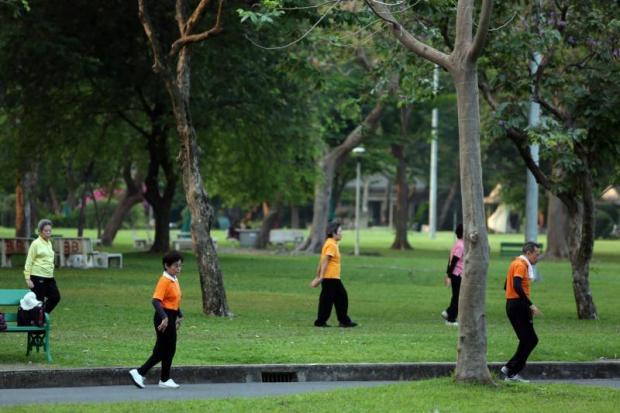Thailand: Selling senior services
Economists say the growing ageing society will create tremendous growth opportunity for businesses.
They say brands and marketers in Thailand should make haste to offer services and marketing to support this group of customers as the number of people aged between 60 and 65 years old will reach 18% of total population next year.
But some businessmen say it is not so easy to penetrate the senior market unless their products are striking, creative and functional.
“Selling products for the elderly is actually difficult. They are quite cautious spenders,” says Jirachai Tangkijngamwong, an R&D director of Deesawat Industries Co, which makes and sells lifestyle and wellbeing furniture.
Many elderly feel it is unnecessary to buy new furniture or products as they are old, with some spending most of their time in bed.
Considering the obstacles, Mr Jirachai believes the best way and time to capitalise on this market is to provide lifestyle products with creative designs and functions, targeting not the really old but those who are getting there.
“By this, I mean 50-somethings, people who still have strength but are aware of the weakness and illness that they face as they get older,” he says.
Most importantly, it must be products that enable them to continue to live comfortably with their families.
Mr Jirachai says the shift in demographics has been a serious issue for a few years in Asian countries, including Japan and more recently Thailand, and state agencies have been encouraging private companies to make products that cater to the elderly.
His company Deesawat has joined a National Science and Technology Development Agency programme to develop products for aged customers.
The company also participates in the Commerce Ministry’s 60+ Project, which enables Deesawat to explore markets and products from top world designers from countries such as Italy and Japan.
In 2014, its brace stool — a support stool for elderly people and those with back problems — won the Design for Wellbeing award in Hong Kong as well as the best product and grand prize awards, says Mr Jirachai.
It has an armrest on one side and a stick on the other to assist the motion and balance of the person sitting down and getting up. It can help not only people with back pain but also fragility and other ailments that come with old age, he says.
Through research Mr Jirachai and his team also invented a chair under his same concept.
“We believe that some traditional therapy like reflexology might be useful. So we have designed a piece of furniture with pinheads under the top end of the armrest that the seated person could use to do a reflex exercise through the fingertips,” he says.
“Our products are not made to treat the elderly or patients like a doctor would, but they have been designed with old people and those with ailments in mind.”
Mr Jirachai says he is now busy studying how to invent products to help seniors with Alzheimer’s disease.
“Many people have asked me why I am not using technologies like those in Japan to help design products. To tell you the truth, I am not convinced at all in having the elderly be with machines or robotics mates, which have been used widely in Japan,” he says.
“It is pretty sad to see them alone with computer-programmed machines.”
60+ Project
Furniture and household products are among the categories listed in the 60+ Project run by the Commerce Ministry’s International Trade Promotion Department.
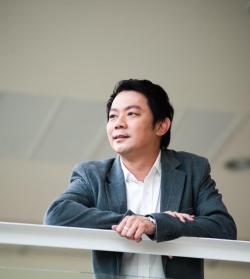
Jirachai Tangkijngamwong, R&D director of Deesawat Industries Co.
Samornrat Snidvongsa Na Ayudhaya, head of the 60+ Project, says the number of manufacturers joining the project remains small since its launch five years ago, with only 20-30 companies participating each time it organises events abroad, such as exhibitions and business meetings.
“It might be because many companies overlook this market, as they are able to sell their products to other customer groups anyway,” she says. If these companies join the project, they could expand their market further without putting in new investment.
“If you are a furniture maker, you may need only to adjust existing production lines,” says Ms Samornrat. “One good example is Deesawat, which makes lifestyle furniture but also uses creativity to make items suitable for the elderly.”
The 60+ Project focuses on eight categories of products used in the daily lives of the elderly: furniture and household items, cosmetics and spa products, medical devices, innovation products, construction materials, fashion items, food and beverage, and services.
The project sometimes offers market tips for Thai companies on how to create products to meet consumers’ demands.
“We invite experts from countries with experience in an ageing society, notably Japan and Italy, to share market insights, trends and business opportunities for Thai firms to develop products to serve this grand generation,” she says.
According to Nielsen Thailand, citing a UN report, the number of people 65 and older will double in the next 15 years, making Thailand the third Asian country with an ageing society behind Japan and Singapore.
The research company also says people aged 45 and over are concerned about losing the ability to perform daily activities such as driving or walking alone. But the survey indicates these people are going to live longer as a result of improving healthcare technology.
Nielsen suggests brands and marketers focus more on this segment because there are chances to create new products to support the health and well-being of elderly consumers.
50+ travellers
Companies offering products for the elderly have to creatively tweak their marketing to be different from that of traditional merchandise, suggests Nielsen. This could mean using larger fonts on products labels or gathering various products in one place for easier access.
Teerapong Prutivanichakul at 50 Plus Holiday Co says the travel business for seniors, the Tour Khon Kae market, is sensitive and needs much attention.
“Some seniors are very demanding and hard to deal with. We’ve been lucky, with most of our clients being nice and easy-going,” he says.
Providing travel service for the elderly is a niche market and could be profitable considering the few players offering it and customers who are willing to pay more for a better quality and rush-free tour programme.
“Our tour prices are 15% higher than other companies because of additional expenses such as having direct flights mostly with Thai Airways, as senior clients dislike flying with connecting flights,” says Mr Teerapong.
Clients also travel by special coaches with facilities for wheelchair users, are focused on healthy food and are in small groups that never exceed 20 people per trip, with two guides to take care of them throughout the journey.
He says the company has been popular with the elderly since it was established six years ago.
“It is a delight to see them having a good time with their family or friends. Many of them share interesting stories of their work and experiences, how they built their fortune — things from which I could learn,” says Mr Teerapong.
He says there are more travel agencies selling such tour programmes at tourism fairs and online as more elderly people have access to digital devices. Surveys show seniors spend more time online communicating and purchasing products and services.
A survey by the Electronic Transactions Development Agency in 2016 found that the elderly and baby boomers spend an average 31.8 hours a week online. It is not high compared with other generations: 40.2 hours by Gen Z, 53.2 hours by Gen Y and 44.3 hours by Gen X, but it is a growing trend.
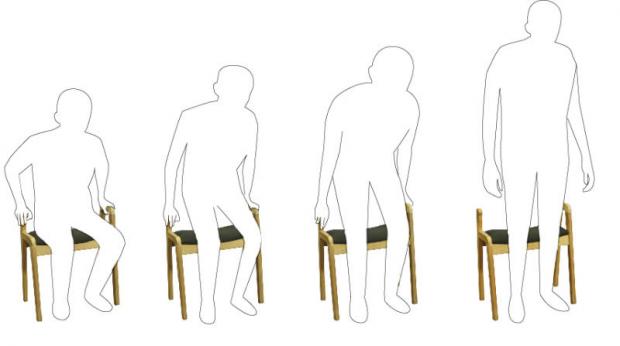
Deesawat’s brace stool, designed for easy mobility, won Hong Kong’s Best Design Award.
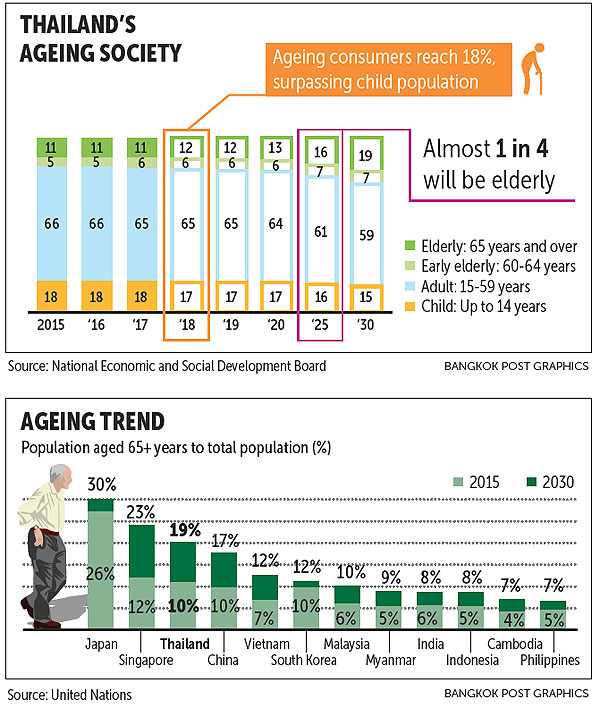
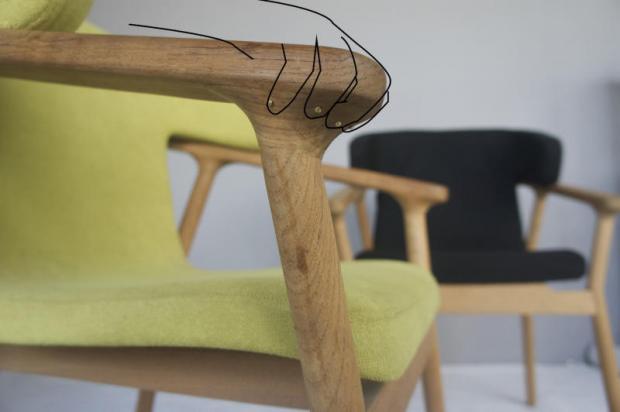
Inset: A chair designed by Deesawat has pinheads under the armrest for reflex exercise.
Source: https://www.bangkokpost.com/business/news/1343231/selling-senior-services


 English
English




